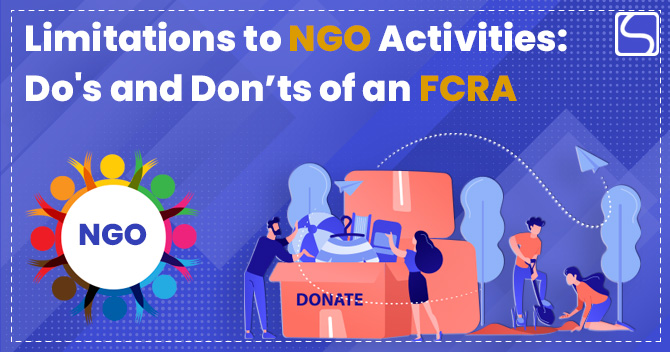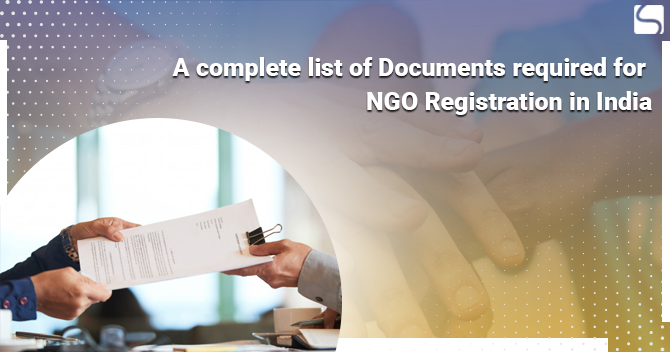Limitations to NGO Activities: Do’s and Don’ts of an FCRA registered NGO

Ganesh Nair | Updated: Aug 20, 2022 | Category: NGO
A non-Governmental Organisation is an organisation that is created to conduct charitable and welfare activities. An NGO aims to work for welfare of the society. NGO Activities help to tackle a wide variety of causes. These causes can be related to the environment, human rights, animal welfare, health and education of children etc. Sometimes the NGOs are created to facilitate awareness relating to social causes amongst the masses, for example, the welfare of Acid attack victims. Whenever NGOs end up making a profit, they can’t disburse it amongst their members. They must ensure these profits are reinfused in the organisation to foster the social cause further.
The Ministry of Home Affairs recently banned numerous NGOs as it tightened FCRA regulations. An NGO accepting foreign funds must ensure that it complies with the Foreign Contribution (Regulation) Act[1]. It must not be engaged in any activity detrimental to the national interest. This blog shall enumerate an NGO’s Do’s and Don’ts while accepting foreign funding.
Table of Contents
DON’Ts for FCRA Registered NGOs:
Intermixing of Local and Foreign funds:
FCRA regulations state the need to open a separate bank account to accept foreign funds. Local funds cannot be deposited in such bank accounts through cash, bank transfer or any other form. The account used to accept foreign funding must be kept separate so that the track of money withdrawn from it can also be monitored separately. Intermixing domestic and foreign funds for NGO activities should not be done.
Must use the grant for the purpose it was sent for:
Foreign contributions are sent in for a specific project/purpose the NGO is carrying out. So, the organisation must ensure that the grant is not utilised for any other NGO activities apart from the purpose for which the donor has agreed to donate as per the project contract letter. The Surplus of one project should not be diverted to be utilised for other projects if there is a shortfall.
Don’t make Transfers to an unregistered organisation:
The Funds received under FCRA must not be transferred to an organisation that is a non-FCRA. In case such transfers are being made, prior approval from the Central Government is required. However, the payment of such funds to direct beneficiaries or to the person against rendering service can be made.
Withdrawals & payments:
The government has stated that if the entities indulging in the FCRA make payments for expenditure more than that of ₹ 20,000 in cash, they are bound to face scrutiny by the government. Therefore the organisations must refrain from making cash payments and instead opt for digital payments, payee cheques or bank transfers.
Inter-Transfer of Funds:
FCRA norms allow the opening of one or more accounts called utilisation accounts for the use of foreign funds once it is received in the authorised FCRA bank account. However, no funds other than the ones received in the main account should be transferred to the utilisation accounts. The law is silent on whether the funds can be transferred between the utilisation account or not. Still, the organisation must avoid it so that it does not draw unnecessary scrutiny from the government and hamper NGO activities.
Investment in Mutual funds and other securities:
FCRA registered organisations are disallowed from investing in mutual funds or other securities that are uncertain. But the FCA’s are allowed to utilise the local funds for investment subject to the provisions of the Income Tax Act under Section11 (5). FCRA funds should be invested in the form of FDs in banks to ensure their safety.
Limitation of Admin. Expenses:
As per rules, FCRA organisation must restrict their administrative expenses to a maximum of 50% of the total contributions received. However, this can be changed after receiving prior approval from the central government.
Contribution received after suspension:
In case an NGO’s FCRA registration is suspended or temporarily cancelled by the government for violating the FCRA regulations, then it should stop accepting foreign contributions to carry out NGO activities.
Receiving funds in Utilisation accounts:
FCRA organisations should refrain from accepting funds in the utilisation accounts directly or any account for which Form FC-6C the organisation has failed to file. All the foreign funds must be received in the main Designated bank account of the organisation and not at any other account.
False Statements:
NGOs must not give out any false information or try to take any permission from the government based on misrepresentation or concealment of facts or information.
Dos for FCRA Registered NGOs
Maintaining separate books:
It is recommended that NGOs maintain separate books of accounts for the FCRA and local funds. Books for FCRA dealings should be kept separate, and only entries regarding FCRA activities should be made in them. This practice helps with enhancing transparency and efficient monitoring and helps the organisation produce the records to the ministry of home affairs as and when required.
Single Dedicated Bank account for funds:
The NGOs should maintain only one “dedicated account” for receiving foreign funds. An organisation should disperse the amount to utilisation accounts through this main account only. They should not receive any funding directly in any utilisation accounts. If the organisation plans to change the account, it should inform the government through Form FC-6C within 15 days of doing so.
Filing of Returns:
The FCRA NGOs, irrespective of the fact whether they are granted permanent registration/ permission, must file Annual returns for FCRA every year. As per the norms, if there are no funds received during a year, the organisation must file the returns as NIL mandatorily.
Renewal of Registration:
The FCRA certificate given to NGOs is valid for a period of 5 years. After which it needs to be renewed. All the organisations who need to file an application through form FC-3C for the renewal of the certificate. This application must be filed at least six months before the expiration of the license. If an organisation fails to do their license shall be ceased or cancelled.
Intimation of Changes:
The FCRA organisation must intimate the central government in case any changes are made in
- Name of the organisation
- Banks accounts
- Aims or objectives of the organisation
- More than 50% change in key members
- These changes can be made by filing FC-6.
Conclusion:
NGOs are created for the welfare of the people. To carry out the NGO’s activities effectively, funds are required. If an NGO wants to invite funds from foreign sources, they need to be registered under the FCRA. An NGO must fully comply with norms set by FCRA in order to function in India. If an NGO fails to do so, then it shall be subjected to heavy scrutiny by the government, which can even lead to suspension of the NGO.
Read our Article:An Overview of Difference between NGOs and Trust















